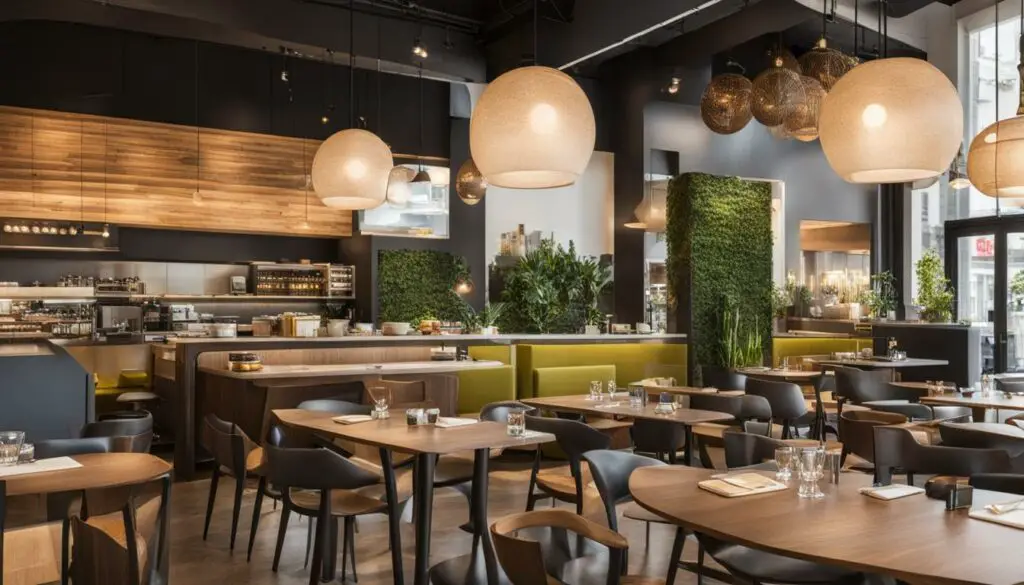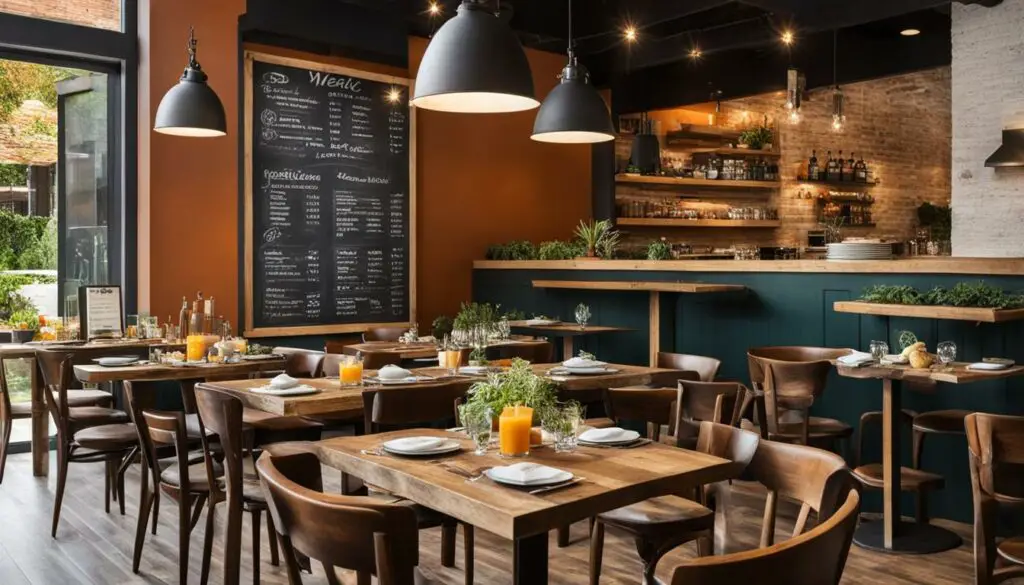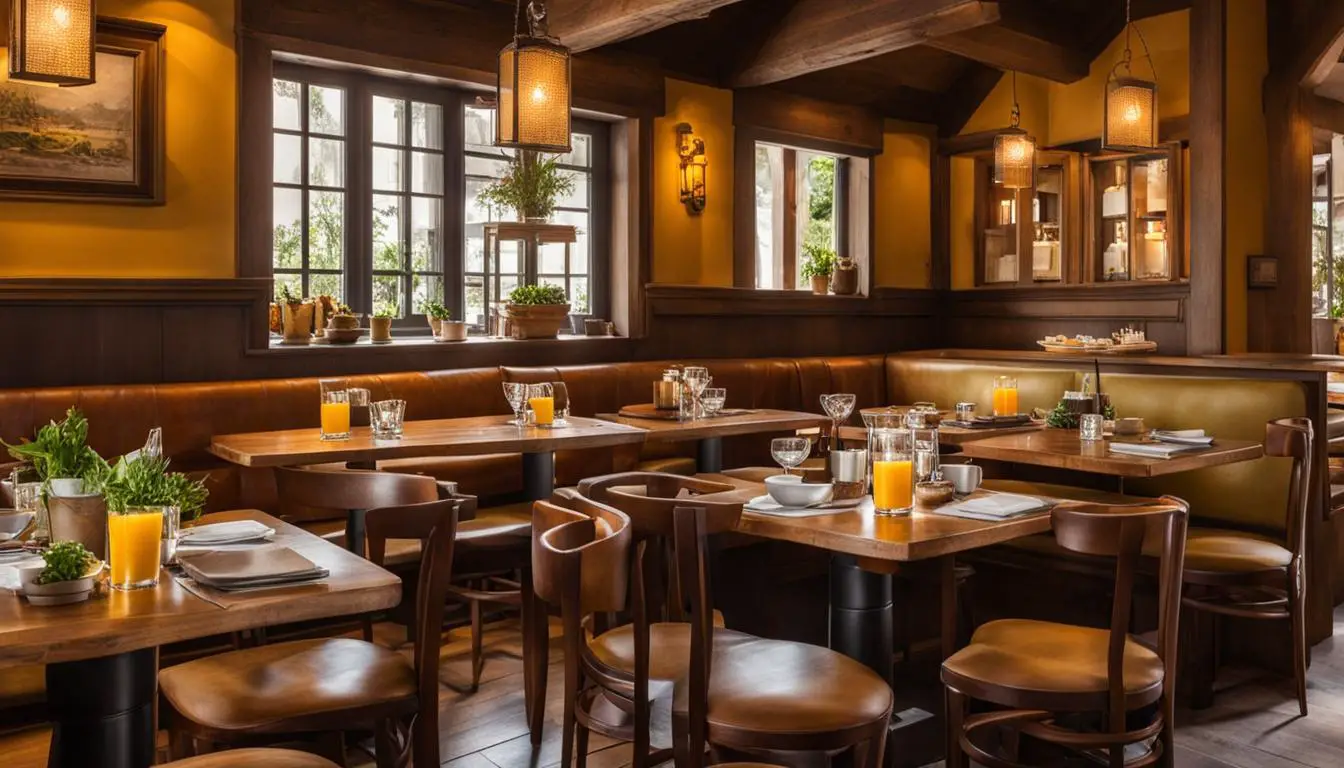Are you passionate about breakfast food and eager to start your own business? Opening a breakfast restaurant can be a lucrative venture in the growing $10 billion breakfast restaurant industry in the U.S. With breakfast occasions expected to grow at five percent through 2019, now is the perfect time to tap into this profitable market.
In this article, we will guide you through the process of starting your own breakfast restaurant. From understanding why breakfast restaurants are a wise choice to considering important factors before opening, developing a clear concept, creating a comprehensive business plan, securing funding, obtaining licenses and permits, finding the right location and equipment, staffing your restaurant, and implementing effective marketing strategies, we’ve got you covered.
By following these steps and taking advantage of the insights and expert advice provided, you’ll be well on your way to opening a successful breakfast restaurant that attracts loyal customers and generates consistent revenue.
Contents
- 1 Why Choose a Breakfast Restaurant?
- 2 Things to Consider Before Opening a Breakfast Restaurant
- 3 Define Your Breakfast Restaurant Concept
- 4 Develop a Business Plan for Your Breakfast Restaurant
- 5 Secure Funding for Your Breakfast Restaurant
- 6 Obtain the Necessary Licenses and Permits
- 7 Location and Equipment for Your Breakfast Restaurant
- 8 Staffing and Marketing for Your Breakfast Restaurant
- 9 Conclusion
- 10 FAQ
- 10.1 How do I open a breakfast restaurant?
- 10.2 Why should I choose a breakfast restaurant?
- 10.3 What should I consider before opening a breakfast restaurant?
- 10.4 How do I define my breakfast restaurant concept?
- 10.5 How do I develop a business plan for my breakfast restaurant?
- 10.6 How do I secure funding for my breakfast restaurant?
- 10.7 What licenses and permits do I need for my breakfast restaurant?
- 10.8 How do I find the right location and equipment for my breakfast restaurant?
- 10.9 How do I staff and market my breakfast restaurant?
- 10.10 What are the key steps to successfully opening a breakfast restaurant?
- 11 Source Links
Key Takeaways:
- Opening a breakfast restaurant is a profitable opportunity in the $10 billion breakfast restaurant industry.
- Breakfast foods are popular and accessible to consumers, making them an attractive choice for a restaurant business.
- Consider important factors such as location, competition, and financial investment before starting your breakfast restaurant.
- Create a clear concept and business plan to guide your restaurant’s development and growth.
- Secure funding through options like small business loans, personal capital, or investors.
Why Choose a Breakfast Restaurant?

Breakfast foods are affordable and easy to prepare, making them attractive to consumers who prefer someone else to do the meal preparation. In addition, the popularity of breakfast offerings at all-day dining establishments has been on the rise. Nearly 80 percent of consumers enjoy breakfast offerings throughout the day. With the right concept and menu, a breakfast restaurant can be a lucrative business venture.
If you’re considering entering the breakfast restaurant industry, it’s important to understand the current trends and dynamics of the market. The rise in breakfast consumption is driven by various factors, including busy lifestyles, changing dietary preferences, and the desire for convenience.
By opening a breakfast restaurant, you can tap into this growing market and cater to customers seeking delicious breakfast options at any time of the day. Whether it’s pancakes, omelets, or avocado toast, breakfast food has a universal appeal that attracts a wide range of customers.
Furthermore, breakfast restaurants offer a unique dining experience. They provide a cozy and inviting atmosphere where patrons can start their day with a satisfying meal. People often have fond memories associated with breakfast, whether it’s enjoying a leisurely brunch with friends or indulging in a hearty breakfast before a busy day.
In addition to the demand for breakfast offerings, another advantage of choosing a breakfast restaurant is the relatively lower costs compared to other types of dining establishments. Breakfast foods typically require fewer expensive ingredients and simpler cooking techniques. This can help streamline operations and minimize overhead costs, ultimately boosting your profit margins.
However, like any other business venture, success in the breakfast restaurant industry requires careful planning and execution. Having a well-thought-out breakfast restaurant business plan is essential to navigate the competitive landscape and differentiate your establishment from others.
Next, we will explore the key considerations you need to keep in mind before opening a breakfast restaurant. From location selection to licensing requirements, these factors play a vital role in the overall success of your business.
Things to Consider Before Opening a Breakfast Restaurant
Before embarking on your journey to open a breakfast restaurant, there are several crucial factors that require careful consideration. These considerations will help you make informed decisions and set a strong foundation for your new business venture.
- Willingness to work early morning hours: Running a breakfast restaurant means embracing early mornings. From prepping ingredients to opening your doors to serve delicious morning meals, being comfortable with early starts is essential.
- Optimal location for foot traffic: Choosing the right location is vital for attracting customers. Look for areas with high foot traffic, such as busy downtown areas, near office buildings, or in close proximity to popular tourist destinations.
- Understanding the demand and competition: Conduct thorough market research to assess the demand for breakfast options in your chosen area. Analyze the competition to identify gaps in the market and determine how you can differentiate your restaurant.
- Financial investment required: Opening a breakfast restaurant involves financial commitments. Consider costs such as leasing or purchasing a space, renovating the premises, acquiring kitchen equipment, hiring staff, and marketing your establishment.
- Engagement with staff and patrons: The breakfast restaurant industry is customer-oriented. Assess your ability to interact with both staff members and patrons, providing friendly and efficient service to create a positive dining experience.
By carefully considering these key aspects before opening your breakfast restaurant, you increase your chances of success and lay the groundwork for a thriving business.
| Factors to Consider | Important Points |
|---|---|
| Willingness to work early morning hours | Embrace the early mornings that come with running a breakfast restaurant |
| Optimal location for foot traffic | Select a location with high foot traffic for increased customer visibility |
| Understanding the demand and competition | Analyze the market and competition to identify opportunities for differentiation |
| Financial investment required | Consider the costs involved, including leasing, renovations, equipment, and staffing |
| Engagement with staff and patrons | Assess your ability to interact with staff and provide excellent customer service |
With a clear understanding of these considerations, you can proceed with confidence as you navigate the exciting process of opening your breakfast restaurant.
Define Your Breakfast Restaurant Concept

Creating a clear concept for your breakfast restaurant is essential for success. Consider factors such as the atmosphere and decor, whether you will hire professionals for design and construction, the name and logo of your restaurant, and the type of service you will offer (take-out, food truck, or sit-down). Decide whether you will serve breakfast all day or have limited service hours, and determine the desired location for your restaurant.
In order to stand out in the competitive breakfast restaurant industry, it’s important to develop a unique concept that appeals to your target audience. Your concept should reflect the overall dining experience you want to provide to your customers.
Whether it’s a cozy coffee shop offering homemade breakfast classics or a trendy, modern eatery serving innovative breakfast creations, your concept should capture the essence of your brand and create a memorable dining experience.
The atmosphere and decor play a significant role in shaping your restaurant’s concept. Consider if you want a casual and relaxed setting or a more upscale and sophisticated ambiance. Choose a design and theme that aligns with your target market and complements your menu offerings.
When it comes to naming your breakfast restaurant, select a name that is catchy, memorable, and reflects the essence of your concept. The name should evoke a sense of anticipation and excitement in potential customers.
For example, a breakfast restaurant focusing on healthy, organic options could be named “Morning Blossoms,” while a breakfast joint with a playful and family-friendly atmosphere might be called “Pancake Circus.”
Additionally, consider creating a logo that represents your brand and resonates with your target audience. A visually appealing and recognizable logo can help build brand recognition and establish a strong identity for your breakfast restaurant.
Another key aspect to consider is the type of service you will offer. Determine whether you want to provide take-out options for customers on the go, operate a food truck for a mobile dining experience, or offer a sit-down service for a more leisurely breakfast experience.
Offering breakfast all day can also be a unique selling point, appealing to customers who crave their favorite morning dishes at any time of the day.
Lastly, carefully select the location for your breakfast restaurant. Consider areas with high foot traffic, proximity to office buildings, or neighborhoods with a vibrant breakfast culture. Evaluating the competition and demand for breakfast options in the chosen area is crucial for your business to thrive.
Defining a compelling concept for your breakfast restaurant sets the foundation for a memorable dining experience and creates a unique selling proposition that sets you apart from the competition.
Develop a Business Plan for Your Breakfast Restaurant
A well-structured business plan is crucial when starting a breakfast restaurant. It serves as a roadmap for your venture, guiding you through each step of the process. The U.S. Small Business Administration provides a handy breakfast restaurant startup guide, offering valuable insights and suggestions.
A comprehensive business plan typically includes the following sections:
- Executive Summary: A concise overview of your breakfast restaurant concept, goals, and financial projections.
- Company Description: Details about your restaurant, including its mission, vision, and legal structure.
- Industry and Market Analysis: An examination of the breakfast restaurant industry, your target market, and competitors.
- Target Market: A profile of your ideal customers, their preferences, and demographics.
- Marketing Strategy: A plan to attract and retain customers, including online and offline marketing tactics.
- Management Plan: An outline of your team members’ roles and responsibilities, as well as their qualifications.
- Financial Projections: Detailed financial forecasts, including income statements, cash flow projections, and balance sheets.
To ensure accuracy and professionalism, it’s advisable to consult with experts such as business accountants and attorneys during the business plan development process. They can provide valuable insights and help you navigate complex financial and legal aspects.
Incorporating a well-researched financial plan into your business plan is crucial. It should include realistic revenue projections, cost estimates, and break-even analysis. This financial plan will serve as a benchmark against which you can measure your future performance and make informed decisions.
Remember, a robust business plan not only helps you secure funding and investors but also serves as a valuable reference document as your breakfast restaurant startup progresses.
Sample Business Plan Table
Secure Funding for Your Breakfast Restaurant

Starting a breakfast restaurant is an exciting endeavor that requires a significant financial investment. To ensure a successful launch, conducting a thorough financial analysis is essential. This analysis will help you determine the costs involved in opening your breakfast restaurant, including real estate, construction, equipment, and staffing.
Once you have a clear understanding of the financial requirements, it’s time to explore different funding options. Here are a few options to consider:
1. Small Business Loans
Small business loans are a popular choice for entrepreneurs looking to secure funding for their breakfast restaurant. These loans are typically provided by banks or other financial institutions and can be used to cover various expenses, such as startup costs, equipment purchases, and operational expenses. When applying for a small business loan, having a well-documented business plan and a strong credit history will increase your chances of approval.
2. Personal Capital
Using personal capital is another option for funding your breakfast restaurant. This can include savings, investments, or even borrowing from friends and family. Personal capital allows you to retain full control over your business but may involve higher personal financial risk. It’s important to carefully assess your personal financial situation and consult with a financial advisor before using personal capital for your restaurant.
3. Investors
Bringing in investors can provide a significant boost to your breakfast restaurant’s funding. Investors can provide the necessary capital in exchange for an ownership stake or a return on investment. Before approaching potential investors, it’s crucial to develop a compelling business plan and clearly articulate the potential return on investment for them.
Remember, securing funding for your breakfast restaurant is a crucial step in turning your vision into reality. Whether you choose a small business loan, personal capital, or investors, having a solid financial plan, a strong credit history, and a persuasive business plan will greatly increase your chances of obtaining the necessary funds.
Obtain the Necessary Licenses and Permits

Ensuring compliance with legal requirements is essential for operating a breakfast restaurant. To legally operate your business, you need to obtain the following licenses and permits:
- Business License: Apply for a business license from your local government authority. This license demonstrates that you have met all local regulations and can legally operate your breakfast restaurant.
- Tax Identification Number: Obtain a tax identification number from the Internal Revenue Service (IRS) to ensure you can properly report and pay your taxes.
- Liability Insurance: Protect your business from potential risks by securing liability insurance. This will provide coverage in case of accidents, property damage, or legal claims.
Additionally, it is crucial to research the food safety regulations and standards in your area. To ensure compliance, obtain the necessary permits and licenses related to food safety. These requirements may include:
- Food Handling Permit
- Health Department Inspection
- Food Safety Certification
Trademarking your name and logo can provide additional protection for your brand. Consult with legal professionals who specialize in intellectual property to navigate this process effectively and safeguard your restaurant’s unique identity.
By obtaining the necessary licenses, permits, and insurance, you are demonstrating your commitment to operating within the legal channels and ensuring the safety and well-being of your customers and staff.
Location and Equipment for Your Breakfast Restaurant

The success of a breakfast restaurant heavily depends on its location. It’s essential to work with a trusted commercial realtor who can help you select a site that offers high visibility and accessibility to attract customers.
Investing in the right equipment is also crucial for your breakfast restaurant. You’ll need reliable equipment for food preparation, cooking, and serving. Whether you choose to lease or purchase the equipment will depend on your budget and specific needs.
When it comes to location, consider the following factors:
- Proximity to busy areas: Choose a location near office buildings, residential areas, or popular tourist destinations.
- Good foot traffic: Look for a spot with a lot of foot traffic, as it will increase your chances of attracting customers.
- Accessible parking: Ensure that there is ample parking available for your customers.
- Competitor analysis: Research the competition in the area and identify if there is a demand for another breakfast restaurant.
Regarding equipment, consider the essential items you’ll need:
- Kitchen appliances: Invest in high-quality cooking appliances, such as griddles, ovens, and toasters.
- Cookware and utensils: Purchase a variety of cookware and utensils to facilitate efficient food preparation and cooking.
- Serving equipment: Stock up on plates, bowls, cutlery, and glassware for your customers.
- Storage solutions: Ensure you have enough storage space for perishable and non-perishable food items.
- Point-of-sale system: Consider investing in a modern POS system to streamline your billing and payment processes.
Working closely with your commercial realtor and selecting the right equipment will set the foundation for a successful breakfast restaurant. By strategically choosing a location and equipping your restaurant with the necessary tools, you’ll be well-prepared to provide a delightful dining experience to your customers.
Staffing and Marketing for Your Breakfast Restaurant
Staffing plays a critical role in the success of your breakfast restaurant. In today’s competitive labor market, it is important to offer competitive wages and incentives to attract talented and dedicated employees. A well-trained and professional staff is key to providing excellent customer service and creating a positive dining experience for your guests.
When developing your marketing plan, aim to create awareness about your breakfast restaurant and build a loyal following. Utilize both traditional and digital media channels to reach potential customers. Establish a strong online presence through social media platforms, such as Facebook, Instagram, and Twitter, to engage with your target audience and promote your restaurant’s unique offerings.
Consider hiring a marketing agency that specializes in the food and beverage industry. They can help you develop effective promotional strategies tailored to your target market. From crafting compelling content to implementing targeted advertising campaigns, a marketing agency can help you maximize your restaurant’s exposure and attract new customers.
To further enhance your marketing efforts, consider implementing a loyalty program. Rewarding repeat customers with special discounts or freebies can help build a loyal following and encourage word-of-mouth referrals. Additionally, consider partnering with local businesses or organizations to host special events or collaborations to further promote your breakfast restaurant.
Remember, effective staffing and marketing go hand in hand in creating a successful breakfast restaurant. By attracting and retaining talented employees and implementing a comprehensive marketing plan, you can establish a strong presence in the market and cultivate a loyal customer base.
Conclusion
Opening a breakfast restaurant requires careful planning and execution. By defining your concept, creating a business plan, securing funding, obtaining the necessary licenses, finding the right location, and employing the right staff, you can increase your chances of success. These breakfast restaurant success strategies are crucial for establishing a strong foundation for your business.
Another key aspect of success is developing a winning marketing plan. Utilize both traditional and digital media channels to create awareness about your restaurant and attract potential customers. Implement effective promotional strategies to build a loyal customer base and differentiate your breakfast restaurant from competitors.
Additionally, offering a well-curated menu featuring a variety of delicious breakfast options at competitive prices is essential for sustaining and growing your business. Pay attention to the quality of ingredients and flavors, and consider incorporating healthy and dietary-friendly choices to cater to different customer preferences. Strive to provide an exceptional dining experience that brings customers back for more.
FAQ
How do I open a breakfast restaurant?
To open a breakfast restaurant, you need to consider factors such as your willingness to work early morning hours, the location for optimal foot traffic, the demand and competition in your chosen area, and the financial investment required. It is important to create a clear concept, develop a business plan, secure funding, obtain the necessary licenses, find the right location, employ the right staff, and implement effective marketing strategies.
Why should I choose a breakfast restaurant?
Opening a breakfast restaurant allows you to tap into the profitable breakfast restaurant industry in the U.S. Breakfast foods are affordable and easy to prepare, making them attractive to consumers. The popularity of breakfast offerings at all-day dining establishments has been on the rise, with nearly 80 percent of consumers enjoying breakfast throughout the day. With the right concept and menu, a breakfast restaurant can be a lucrative business venture.
What should I consider before opening a breakfast restaurant?
Before opening a breakfast restaurant, you should consider factors such as your willingness to work early morning hours, the location for optimal foot traffic, the demand and competition in your chosen area, and the financial investment required. Additionally, you should assess your ability to engage with staff and patrons, as this is a customer-oriented industry.
How do I define my breakfast restaurant concept?
To define your breakfast restaurant concept, consider factors such as the atmosphere and decor, whether you will hire professionals for design and construction, the name and logo of your restaurant, and the type of service you will offer (take-out, food truck, or sit-down). Decide whether you will serve breakfast all day or have limited service hours, and determine the desired location for your restaurant.
How do I develop a business plan for my breakfast restaurant?
To develop a business plan for your breakfast restaurant, consult the U.S. Small Business Administration’s step-by-step guide. Your business plan should include an executive summary, company description, industry and market analysis, target market, marketing strategy, management plan, and financial projections.
How do I secure funding for my breakfast restaurant?
To secure funding for your breakfast restaurant, conduct a thorough financial analysis to determine the costs involved and explore funding options such as small business loans, personal capital, or investors. Having a strong credit history and a compelling business plan will improve your chances of securing funding.
What licenses and permits do I need for my breakfast restaurant?
To operate a breakfast restaurant, you will need to obtain a business license, tax identification number, and liability insurance. Research the food safety regulations and standards in your area and obtain the necessary permits and licenses. It is also advisable to consider trademarking your name and logo for additional protection.
How do I find the right location and equipment for my breakfast restaurant?
Work with a commercial realtor to select a site that offers high visibility and accessibility. Additionally, invest in the necessary equipment for food preparation, cooking, and serving. Leasing or purchasing equipment can be considered based on your budget and specific needs.
How do I staff and market my breakfast restaurant?
In a competitive labor market, offering competitive wages and incentives is key to attracting talented employees. Develop a comprehensive marketing plan to create awareness about your restaurant and reach potential customers. Utilize traditional and digital media channels to implement effective promotional strategies. Hiring a marketing agency can be beneficial in this process.
What are the key steps to successfully opening a breakfast restaurant?
The key steps to successfully opening a breakfast restaurant include defining your concept, creating a business plan, securing funding, obtaining the necessary licenses, finding the right location, employing the right staff, and implementing effective marketing strategies. Additionally, offering a well-curated menu at competitive prices and developing a loyal customer base are crucial for sustaining and growing your breakfast restaurant business.









